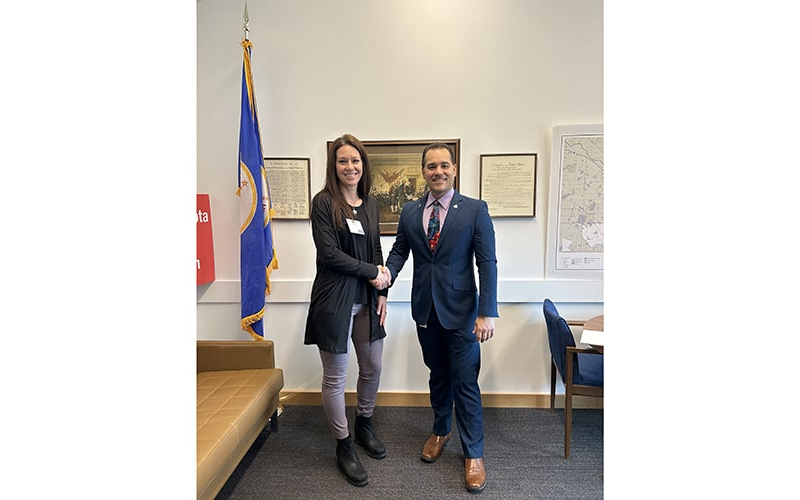Several Accurate Home Care employees are active in their communities or with organizations that, like Accurate, care about others. In so doing, they create meaningful connections with organizations, businesses and others who share a vision for bettering where we live and/or work.
One example is Nicoleen Meyer, Accurate’s VP of Clinical Services. She serves as a board member of the Minnesota Home Care Association (MHCA), a non-profit trade association representing home care agencies from across the state at the legislature and elsewhere. It serves home care providers including basic license, comprehensive license, hospice, Medicare-certified, and PCA providers through advocacy, education, resources, and collaborations.
The board, “is a well-established group of people with a ton of home care experience,” says Meyer, who joined it about a year and a half ago. “Some members have been on it 10 years or more. I’ve been involved closely for the last six years, and part of the workforce workgroup pretty much the entire time.”
That workgroup looks for ways to increase the workforce in home care. “And one of the greatest ways to do that is to target future potential employees, such as nursing students,” she says. “We work with a lot of nursing students—my work here at Accurate lends itself to that.” (See related story).
MHCA encourages home care providers to become a clinical site, like Accurate, and created a tool kit for this. “Sometimes the administrative effort of establishing a clinical partnership can be overwhelming, but the benefits are great. Those toolkits are designed to make it easier,” Meyer says.
Perhaps most important, though, is MHCA’s work with Minnesota’s legislators on protecting if not improving compensation for those who work in home health. This year it is focusing on two key initiatives: extending compensation to cover care evaluations involving medical assistance patients and thwarting a proposed substantial cut in federal funding of Medicare home healthcare.
MHCA, in collaboration with its lobbyists and state representatives and senators, worked on a bill that would provide additional time for care evaluations to be made involving medical assistance patients. Such evaluations typically take longer than other types.
“They authored a bill based on input and feedback from our association members,” Meyer says. “It would make it so care evaluation would be a covered home care service. Care providers have been required to do the care evaluations but have never been reimbursed for the amount of time that takes. Legislators asked, ‘really, how much longer do these take you?’ and we provided that information to them.”
The proposed legislation has been wrapped into an acute care hospital discharge bill that already has the Governor’s attention. As such, Meyer and the MHCA are optimistic it will pass this session.
Before this in 2022 and early 2023, MHCA was instrumental in convincing the state legislature to enact legislation providing a 20 percent increase this year in compensation rates for several types of in-home care providers, benefiting nearly 20,000 health care workers statewide and nurses in the private duty nursing line at Accurate. (See related story).
Meyer’s involvement with MHCA involved a few recent trips to the state capitol. One was a meeting with a member of U.S. Rep. Tom Emmer’s staff encouraging the Majority Whip of the House to push back on a proposed, major cut in Medicare reimbursements supporting in home care.
The U.S. Centers for Medicare & Medicaid Services (CMS) has proposed a permanent -9.36% payment rate cut to Medicare home health beginning in 2024. MHCA discussed with Emmer how, in Minnesota, the gross impact of such a cut to Medicare home health would be more than $8 million over ten years. Nationally, cuts to Medicare home health could reach $20 billion over the next ten years, and this is after the home healthcare industry took a 3.9% cut beginning in 2023. It’s estimated that 48 percent of the nation’s home healthcare organizations would have overall margins below zero if such a cut occurs.
At Accurate, the 9.36 percent rate cut would “harm our ability to meet patient needs and grow to serve more patients,” says Accurate CEO Bill English. “We already operate on such thin margins that any cut harms our ability to fully serve our patients. Even the consideration of these cuts demonstrates how out of touch people in Washington can be with the grassroots in middle America. Accurate would be fine, but we would be further restricted in our growth plans. We would not be alone in this regard.”
Following the visit at Emmer’s office, Meyer returned to St. Paul for MHCA’s “Day at the Capitol.”
“We had a meeting with everyone who came there. Different senators and representatives came in, talked with us, thanked us for being there and shared some talking points on how to [draft a bill that gets passed],” she adds. “They impressed upon us it’s really welcomed that we went to their house as constituents, they are our neighbors, and we should feel comfortable speaking to them like that.”
Meyer says she was paired with a mentor who helped guide her around the Capitol. “She recommended I stop by and greet my senators or representatives. It was cool to see how accessible they are – you can just walk into the building, stop by their office, and say hello if they’re available.”
For example, she stopped and said hello to State Senator Eric Lucero (see photo), who represents District 30 (includes the communities of Otsego, Rockford Township, Saint Michael, Albertville, Hanover, Elk River, Nowthen and Western Oak Grove). Lucero is not working on home healthcare related legislation but does represent the district where Meyer lives and where Accurate has its headquarters.
“Being at the Capitol was a unique experience for me. It’s nice to network with others who understand the healthcare world, bounce ideas off each other and share what you have been having problems with and discuss, ‘what can we do about that?’ The pinnacle of all of that is getting bills like [the one mentioned earlier] written and passed into law,” she says. “It’s just nice to work with others who understand.”


